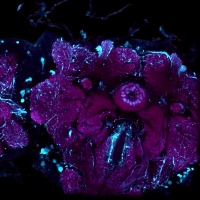Main menu
You are here
Historical Interest Only
This is a static HTML version of an old Drupal site. The site is no longer maintained and could be deleted at any point. It is only here for historical interest.
Previous Projects
Below shows a list of projects that we are actively involved in or have been. You can filter these by showing the projects which are in progress or those which are finished.

 The aim is to develop an open-access, automated, web-based platform for real-time data collation, analysis and information exchange for geophysical experiments. This scientific gateway should enable competing physical hypotheses and statistical methods for forecasting rock failure to be tested and developed in fully prospective mode in an open, testable environment comparable to say daily weather forecasts.
The aim is to develop an open-access, automated, web-based platform for real-time data collation, analysis and information exchange for geophysical experiments. This scientific gateway should enable competing physical hypotheses and statistical methods for forecasting rock failure to be tested and developed in fully prospective mode in an open, testable environment comparable to say daily weather forecasts. The main aim of this project is to remove the barrier of uptake to the seismology community of an application that allows analyses of seismic waveform data. This will be achieved by embedding this analysis application in a community gateway, which already exists in the form of a web portal.
The main aim of this project is to remove the barrier of uptake to the seismology community of an application that allows analyses of seismic waveform data. This will be achieved by embedding this analysis application in a community gateway, which already exists in the form of a web portal.  3D developmental atlases are used in research for capture, collation and analysis of spatio-temporal data such as in situ gene-expression. The most advanced systems are based on a temporal series of 3D models. Examples are the EADHB human embryo atlas in Newcastle and the e-MouseAtlas in Edinburgh. Here we propose to use the 3D spatio-temporal frameworks in conjunction with a repository to deliver research and educational material directly in the context of the developing embryo.
3D developmental atlases are used in research for capture, collation and analysis of spatio-temporal data such as in situ gene-expression. The most advanced systems are based on a temporal series of 3D models. Examples are the EADHB human embryo atlas in Newcastle and the e-MouseAtlas in Edinburgh. Here we propose to use the 3D spatio-temporal frameworks in conjunction with a repository to deliver research and educational material directly in the context of the developing embryo. The mapping of Quantitative Trait Loci (QTL) is the first step towards the identification of genes and causal polymorphisms that affect traits of importance in human medicine and agriculture.
The mapping of Quantitative Trait Loci (QTL) is the first step towards the identification of genes and causal polymorphisms that affect traits of importance in human medicine and agriculture. The world of healthcare could be transformed by realistic models that capture the processes and disorders of the human brain – but creating these involves overcoming immense scientific and technological challenges. The aim of this Theme is to begin with a simpler, more tractable problem: simulating the brain of a fly.
The world of healthcare could be transformed by realistic models that capture the processes and disorders of the human brain – but creating these involves overcoming immense scientific and technological challenges. The aim of this Theme is to begin with a simpler, more tractable problem: simulating the brain of a fly. The primary issue is to enable end-users in the domain of chemistry to make use of computational applications. Currently, a small set of expert-users is able to make use of these tools and they often perform tasks for end-users. This setup does not scale up well as the number of expert-users is not growing. Many of the tasks are well defined and it should be possible to enable these via a web portal.
The primary issue is to enable end-users in the domain of chemistry to make use of computational applications. Currently, a small set of expert-users is able to make use of these tools and they often perform tasks for end-users. This setup does not scale up well as the number of expert-users is not growing. Many of the tasks are well defined and it should be possible to enable these via a web portal.